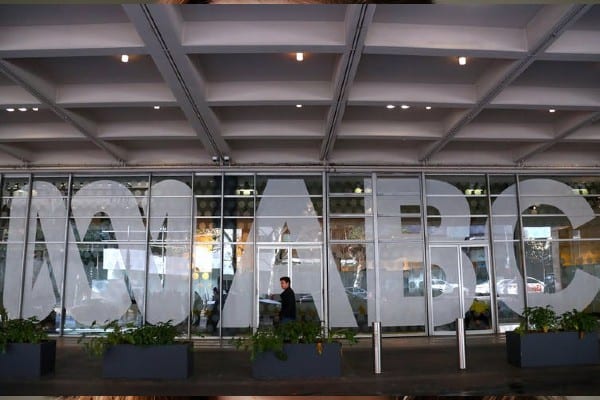The raid at Annika Smethurst’s apartment, in response to an April 2018 article, detailed ‘secret plans’ – leaked to Smethurst – to potentially expand the jurisdiction of the government agency, Australian Signals Directorate, to ‘spy’ on citizens.
At the ABC’s Sydney headquarters, the AFP spent eight hours searching the ABC’s database, looking for documents connected with The Afghan Files.
The story, published in July 2017, cited classified defence information leaked to the ABC about misconduct and ‘unlawful killings’ committed by Australian special forces during the war.
The AFP seized around 100 files on two USBs, which cannot be accessed for two weeks, during which time the ABC’s lawyers can ‘challenge the terms of the warrant as well as claim privilege over the contents of the documents’.
This comes after 2GB radio host, Ben Fordham, was pressured by the Department of Home Affairs to reveal the ‘senior Home Affairs source’ who disclosed confidential information about illegal boat smuggler activity coming from Sri Lanka.
While both Prime Minister Morrison and the AFP say the raids were conducted independently – and legally – by the AFP, the concern is that the AFP’s ‘heavy-handed’ approach is threatening press freedom in this country.
ABC Chair, Ita Buttrose, released a statement condemning the raids as ‘clearly designed to intimidate’, arguing that the fundamental role of journalists is to cover important topics and ‘ask difficult questions’:
“Public interest is best served by the ABC doing its job, asking difficult questions and dealing with genuine whistle-blowers who risk their livelihoods and reputations to bring matters of grave import to the surface.”
This sentiment has been echoed around the world, including by our own Media, Entertainment and Arts Alliance, the BBC, Al Jazeera, Reporters without Borders, NBC, CNN, media personalities Ray Martin and Kerry O’Brien and our most senior Labor politicians.
Prime Minister Morrison, however, says the raids were in-line with the AFP’s duty to uphold the law, and do not undermine the media’s democratic right to free press.
Increased pressure on journalists, like Fordham, to reveal their sources and not report on sensitive topics in the public interest, however, suggests otherwise. (Not to mention, the AFP’s decision to drop it’s investigation into the leaking of documents concerning the Medevac Bill, arguably demonstrating bias towards investigating only the stories that have embarrassed the government.)
In fact, new legislation increasing the powers of the AFP and government agencies to tap into journalist and whistle-blowers’ devices was passed just last year.
The Telecommunications and Other Legislation Amendment (Assistance and Access) Act 2018 gives government agencies greater powers to target individuals, including journalists, by ‘covertly installing weaknesses and vulnerabilities in specific devices, circumventing passwords or allowing encrypted communications to be decrypted’.
Regardless of the raids, this demonstrates a clear intention by our government to censor news coverage when required and allow them legal means to punish whistle-blowers and journalists for exposing embarrassing truths.
So, while the AFP may have conducted these raids, the government is responsible for setting this dangerous new precedent on how we understand ‘free press’.
Without a bill of rights constitutionally guaranteeing journalists’ and whistle-blowers’ protection, the Telecommunications Act could allow the AFP to unveil confidential sources and documents and subsequently criminalise investigative reporting.
In an opinion piece, Studio 10 co-host Joe Hildebrand writes that the ‘ham-fisted’ approach of the AFP will, ironically, strengthen our commitment to democracy, with the backlash likely to force the government to tighten the reins on their powers.
“The agencies who commissioned these investigations and exacted these raids have inadvertently clipped their own wings by so blatantly demonstrating the dangers of unchecked power.”
In other countries, particularly those with a predisposition towards authoritarianism, state-sponsored censorship shapes the national interest, not the media.
Journalists who investigate topics deemed out of bounds are suitably punished.
In Russia, countless journalists covering ‘powerful Russian institutions’ have paid with their lives for exposing truths, mysteriously slipping or falling to their deaths.
Each of these deaths has been ruled a suicide despite a lack of evidence.
In total, 58 Russian journalists have been murdered since the 1990s.
China is the world’s ‘top jailer’ of journalists, with 60 imprisoned as of December 2018. 46 of those incarcerated are ‘non-professional bloggers’, some of whom have been jailed for a single post on social media.
But the Chinese government’s control and censorship of the news is not just about silencing journalists; they are literally re-writing history.
The government’s ‘censorship apparatus’, known as the ‘Great Firewall’, blocks ordinary citizens’ searches for keywords, photos and references to dates of events that they want to erase from public consciousness.
They’ve also created their own versions of social media platforms and other popular websites, blocking western versions.
The Chinese government uses these powerful censorship techniques to erase events like the Tiananmen Square Massacre of June 4, 1989, a student-led pro-democracy protest in which hundreds (possibly thousands) of people were killed by government forces.
In the lead-up to the thirtieth anniversary of the massacre, popular Chinese websites shut down interactive parts of their website for so-called ‘maintenance’.
Electronic Frontier Foundation reported that five Chinese video and livestreaming sites disabled comments until after the anniversary passed; a networking site disabled discussions, and WeChat ‘blocked users from changing their status messages, profile pictures, and nicknames’.
Interviews with young Chinese students on Netflix’s Patriot Act show the success of the government’s stringent censorship – most had little or no idea about the significance of June 4, 1989 in their country’s history.
While Russia and China have particularly alarming track-records of detaining or killing journalists for exposing truths, the primary concern for our media is that both the government and AFP are conflating security with a need for increased spying powers. Such security measures fundamentally undermine the concept of free press – a cornerstone of any functioning democracy.


